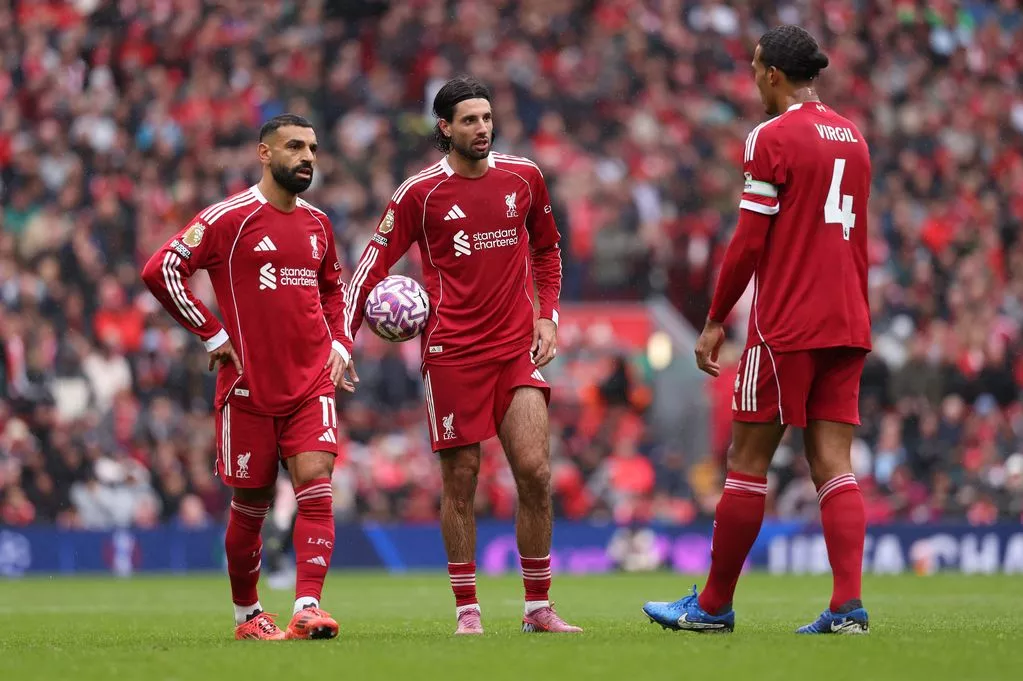Alexander Isak is to blame: Liverpool striker slammed for ‘unprofessional’ attitude amid claim he ‘owes Newcastle’ for refusing to train and play

Alexander Isak’s story this season has been one of noise, anger, ambition, and redemption. The Swedish striker, who arrived at Liverpool for a British record fee of £125 million, has quickly found himself at the centre of a storm. The move that was supposed to define his career has instead brought questions about his attitude, his professionalism, and even his loyalty. To many Liverpool fans, Isak was meant to be the final piece of the puzzle, the new hero to replace the fading shadows of past legends. But for Newcastle United supporters, he became something else entirely — a player who turned his back on the club when they needed him most.
It all began during the summer, a long and messy transfer saga that stretched across months of rumours, silent tensions, and broken relationships. Isak, Newcastle’s star forward, had made his intentions clear behind the scenes: he wanted to leave. Liverpool had come calling, and for him, that was the opportunity of a lifetime. The champions wanted him, Arne Slot wanted him, and he believed his destiny was waiting at Anfield. But Newcastle weren’t ready to let go. They had built their attack around him, invested faith and money into him, and they didn’t want to lose their best player — especially not to a direct Premier League rival.
When the first offer came in, Newcastle refused. £110 million wasn’t enough, they said. Liverpool waited, knowing that the player’s desire would eventually change everything. And it did. From that point, Isak’s relationship with Newcastle began to collapse. Reports started to emerge that he wasn’t training properly, that he had stopped showing up to team sessions, that he was distancing himself from his teammates. At first, fans thought it was just gossip, the kind of noise that always follows big transfers. But then it became clear — Isak was refusing to train.
The word “strike” started to appear in the headlines. The player many called the future of Newcastle was no longer wearing the club’s colours, no longer part of the team’s pre-season tour. Instead, he was training alone, waiting for Liverpool’s move to be completed. The club was furious. The manager felt betrayed. Supporters who once sang his name began to call him selfish. But Isak stood firm. To him, Newcastle had broken promises. He believed they had agreed to let him leave if a top club came for him, and now they were going back on their word. He said it openly — Newcastle had lied about his future. The club denied it. They insisted that no promises had been made, and that Isak was still under contract.
In football, truth often sits somewhere in between. But one thing was undeniable — Isak had burned his bridges.
When the move finally went through on deadline day, it was chaos. Liverpool paid £125 million, a record fee that shocked the Premier League. Newcastle accepted it reluctantly, knowing they had no choice. Isak got what he wanted. The deal made headlines across Europe. But while he smiled during his presentation at Anfield, others were not smiling. Among them was former Liverpool midfielder Don Hutchison, a man who played the game with grit and pride, and who never hesitated to call out what he saw as wrong.
Speaking in an interview, Hutchison did not hold back. “There’s no doubt he’s been unprofessional,” he said bluntly. “Alexander Isak should have been more professional over the summer, and he’s paying for it now.” The words hit hard, and they were true in many ways. Hutchison explained that a footballer must always think of the bigger picture, that even when a transfer is close, your duty is to stay fit, to stay ready. He said walking away from training camp was poor, that Isak should have continued to train with Newcastle even if he knew he would leave. “If the move didn’t happen,” Hutchison said, “he’d still be match fit for Newcastle. If it did, he’d be fit for Liverpool. But instead, he’s behind now because he chose not to train.”
That criticism touched a mere. For fans, professionalism is sacred. Players can dream of moves, they can want transfers, but refusing to play crosses a line. Hutchison even went further, suggesting Isak had been badly managed by his agent. “It comes down to the player, ultimately,” he said. “He’s under contract with Newcastle, he owes them fitness and professionalism. He’s been naive, and now he’s playing catch-up.”
Those words echoed across social media, and suddenly the story shifted from excitement about Liverpool’s new signing to a debate about responsibility and ethics in modern football. Has player power gone too far? Are stars like Isak too quick to force their way out? Or was this just the reality of a sport where loyalty lasts only until the next offer arrives?
For Isak, all of this noise came as he tried to adapt to life at Liverpool. His pre-season absence had left him far behind in fitness, and Arne Slot knew he couldn’t rush him. Liverpool’s style requires energy, pressing, constant movement — things that demand a fully fit body. So Slot managed him carefully, bringing him off the bench, giving him minutes slowly, trying to rebuild what had been lost during that chaotic summer.
Six games into his Liverpool career, Isak had scored one goal and provided one assist. It wasn’t bad, but for a £125 million signing, expectations were higher. The fans wanted fireworks, goals, dominance. What they got instead was a quiet beginning, full of glimpses but not yet the explosion they hoped for. But to Isak’s credit, he remained calm. In interviews, he sounded happy, grateful even. “It’s been great so far,” he told Swedish reporters before his national team match. “A great team and a city where the relationship between the team and the fans is strong. It feels special.”
His words sounded genuine. Perhaps he was relieved that the saga was over, that he could finally focus on football again. But the critics hadn’t stopped talking. Many said he had damaged his reputation, that the way he left Newcastle would always follow him. Others said Liverpool were taking a risk signing someone who had already shown he could walk away when things didn’t go his way.
Yet football has a way of forgiving when goals start coming. For Isak, that is the next chapter — to turn the noise into silence with his performances.
Liverpool’s schedule after the international break is brutal. Manchester United, Eintracht Frankfurt, Brentford, Crystal Palace, Aston Villa, and then Real Madrid in the Champions League. Every one of those games is huge, every one another test for a player who still isn’t at full speed. Daily Mail reporter Lewis Steele revealed that Isak’s road to full fitness could still take months. “They expect it to be about three months until he’s fully fit,” Steele said. “He’s been at Liverpool for about five weeks now, so maybe in another month or so, we’ll see him at his best.”
That timeline makes sense. Fitness is not something you can buy, no matter the price tag. Hutchison’s earlier words suddenly sound prophetic — by refusing to train properly during the summer, Isak has made his own journey harder. But even as critics question him, there are signs of promise. His assist last weekend was clever, his goal against Southampton showed his striker’s instinct. Slowly, he is starting to adapt.
Still, the label “unprofessional” lingers. Fans argue about it daily — some defend him, saying he did what any ambitious player would do. Others say he betrayed Newcastle, that he owed them more respect after everything they gave him. The truth is complicated. Isak is not the first player to force a move, and he won’t be the last. Football today runs on ambition, money, and timing. When a big club like Liverpool comes knocking, it’s hard to say no.
But this saga has shown another side of the game — the emotional toll. For Newcastle fans, losing Isak wasn’t just losing a striker. It was losing a connection. He was supposed to be the one who carried them forward, the man to lead them into Europe again. Instead, they watched him walk away, not even saying goodbye properly. For them, he will always be the one who left when it mattered most.
At Liverpool, though, he has a chance to rewrite everything. Anfield has a way of turning villains into heroes, of giving players a second life. If Isak starts scoring, if he helps them win titles, nobody will talk about the summer anymore. Football is a short memory game. Success erases sins.
Arne Slot knows this too. He’s been patient with Isak, giving him time, support, and protection from the critics. “He’s adapting well,” the Liverpool manager said quietly last week. “He’s working hard. The quality is there. It’s only a matter of time.” Those are calm words from a coach who understands pressure. Slot himself is under scrutiny, replacing Klopp, dealing with expectations, and guiding a new era. He sees Isak not as a problem, but as a project — one that could define his time at Liverpool.
Behind all the drama, there is still the simple truth of a young man chasing his dream. Isak grew up watching the biggest clubs, dreaming of nights under the lights in stadiums like Anfield. When the chance finally came, he grabbed it, maybe too hard, maybe without enough patience. But that’s youth — driven by desire, blind to consequences. Now, at Liverpool, he’s learning what responsibility really means.
The next few months will decide how history remembers his move. If he becomes the striker Liverpool needed, the summer strike will fade into a forgotten headline. If he fails, the critics will remind everyone how it began — with a refusal to train and accusations of arrogance. That’s how football works.
As the season continues, Liverpool fans wait for that first explosive moment — the game where Isak truly announces himself. Maybe it will come against Manchester United, maybe in Europe under the Anfield floodlights. When it comes, it will feel like a storm breaking after months of clouds.
For now, he works in silence, trying to make up for lost time, running extra after training, studying Slot’s system, trying to understand his teammates’ movements. He knows that reputation in England is built on consistency, not headlines. He knows that £125 million is more than a price — it’s a weight.
But if there’s one thing everyone agrees on, it’s that Isak has the talent. His pace, his touch, his finishing — they are world-class. What he needs now is rhythm, confidence, and time. Liverpool believe in him, Slot believes in him, and maybe that’s all that matters.
Don Hutchison’s criticism may have sounded harsh, but in a strange way, it might be the push Isak needed. Sometimes you need someone to tell you the truth, to remind you that talent without discipline is wasted. Hutchison was right — professionalism matters. Maybe this is how Isak learns that lesson, not through words but through experience.
The story of Alexander Isak’s move from Newcastle to Liverpool is not just about transfers or money. It’s about emotion — ambition, betrayal, forgiveness, and the search for belonging. He left one city angry and arrived in another full of hope. Somewhere between the two, he lost a bit of himself. Now, he’s trying to find it again in front of fifty thousand roaring fans who only care about one thing — goals.
The critics will keep talking. The fans will keep waiting. And Isak will keep running, trying to prove that the boy who refused to train has now become the man who fights for every ball. Football is cruel like that. One bad decision can follow you forever — but one moment of brilliance can erase it all.
At Anfield, he has that chance. And maybe, just maybe, one day even Newcastle fans will look back and say, yes, he left, but at least he became something great. Because sometimes, even the messiest beginnings can lead to beautiful stories. And for Alexander Isak, this story is only just beginning.















